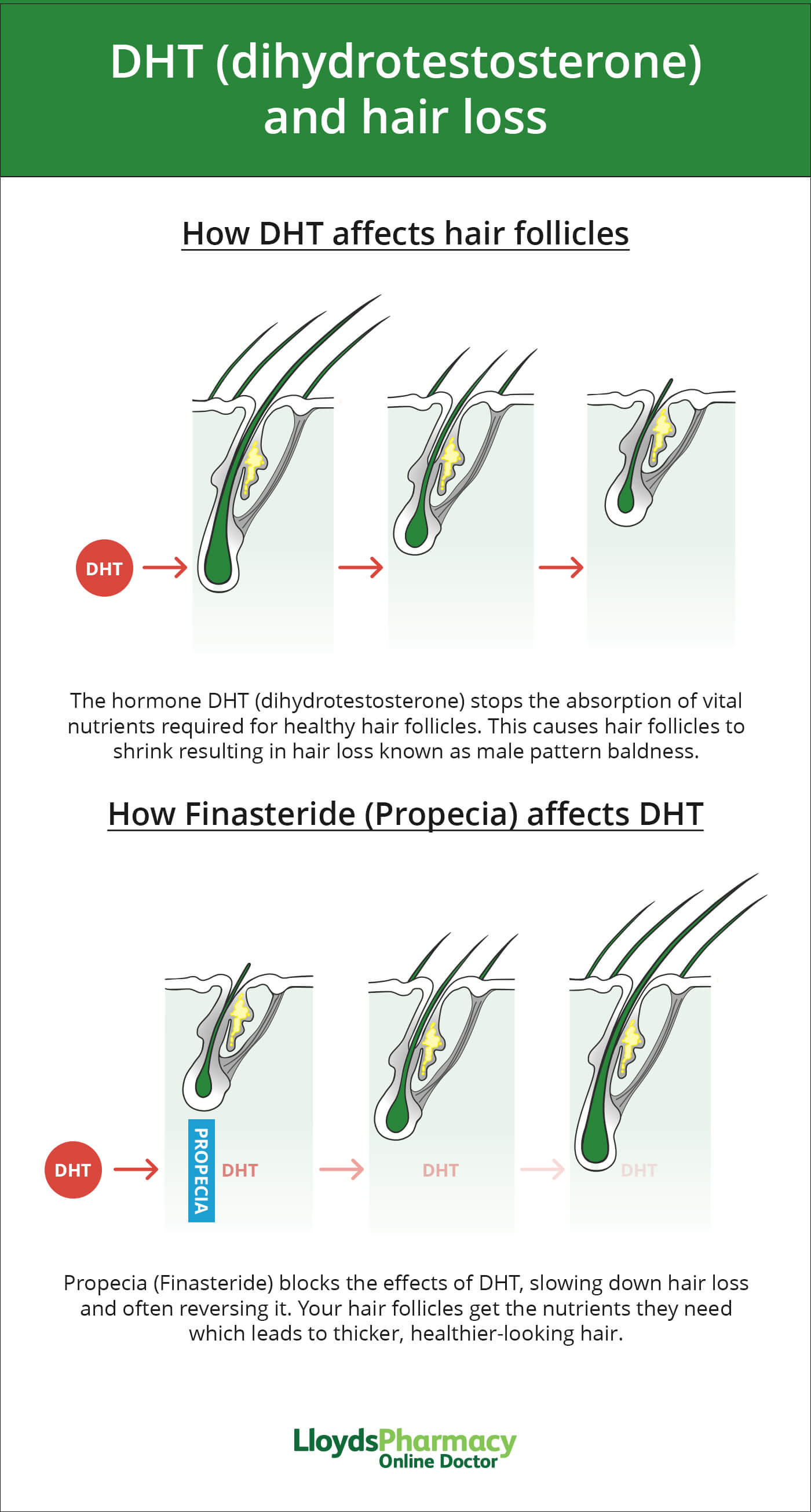What is Propecia?
Propecia is a prescription tablet used to prevent and treat male pattern baldness. It’s the branded version of finasteride, which has been used to treat hair loss since 1997, and is effective in 90% of men.
Propecia should be taken once a day orally and should start to show effects after three to six months.
How does Propecia work?
The finasteride in Propecia stops the testosterone in your body from transforming into another hormone called dihydrotestosterone (DHT) by blocking the action of an enzyme called 5-alpha-reductase.
DHT stops your hair follicles from absorbing vital nutrients. These nutrients are needed for healthy hair growth.
For a clearer look at how Propecia works, please look at the infographic below:

How quickly does Propecia work?
How long does it take for Propecia to start working?
Propecia should begin to show results after three to six months when taken correctly (one tablet a day). However, this can take longer for some men - don’t give up if you’re not seeing hair growth just yet!
Can you take Propecia every other day?
No - it is recommended that you take Propecia once a day for the hair regrowth treatment to start working as intended.
How long can you take Propecia before you know it isn’t working?
If you’ve been taking Propecia for over a year and you’re yet to see any change up top, it’s likely that you do not respond to finasteride. If that’s the case, please consult your GP for next steps.
What happens if I stop taking Propecia?
If you stop taking Propecia, its effects will wear off and hair loss will start again within 6-12 months.
Does Propecia treat the underlying causes of hair loss?
What are the causes of hair loss?
There are several factors that can cause hair loss:
- Stress
- Shock
- Hormone imbalance
- Genetic predisposition to male pattern baldness
- Side effects of medical treatments
- Nutritional deficiencies
Is Propecia my only option to stop hair loss?
There are a number of other options to treat hair loss, including minoxidil, steroid creams and hair transplants. However, please make sure you consult your GP before embarking on any of these.
“It is important to speak with a GP if you’re concerned about hair loss in order to choose the safest and most effective treatment for you.” - Dr Neel Patel
How to take Propecia
Propecia is an oral tablet that should be taken once a day. It can be taken with or without food.
Propecia must be taken consistently in order to effectively begin treatment, and taking multiple tablets a day will not speed up the hair growth process. If you stop taking Propecia, your hair loss will return.
How effective is Propecia?
Propecia is considered the most effective hair loss medicine available. One clinical trial studying men aged 18-41 with mild or moderate hair loss showed Propecia having a positive effect on 90% of men, either maintaining their existing hair count or stimulating regrowth.
As mentioned, it will likely be three to six months before you start to see an effect from Propecia, though the following steps can be taken to maintain your hair’s health in the meantime:
- Maintain your vitamin levels, in particular vitamin D and biotin
- Eat a healthy diet
- Consider a DHT blocking shampoo
However, it is unlikely that Propecia will be effective when taken by men who:
- Already have severe hair loss (very little hair left)
- Are not suffering from male pattern baldness (i.e. other types of hair loss)
- Have a receding hairline
- Do not take Propecia every day
Propecia is not a permanent cure for male pattern baldness. If you stop treatment, hair loss can resume within six months.
What are the side effects of Propecia?
Propecia side effects are uncommon and usually mild. Propecia has been known to cause:
- A rash
- Reduced sex drive
- Low mood
- Erection problems
- Tenderness on or around the nipples
Finasteride has also been associated with depression and suicidal thoughts. A low sex drive and erectile dysfunction have persisted even after a person has stopped taking finasteride, though this is rare.
For full information on side effects and correct use, see the patient information leaflet. If any Propecia side effects concern you, contact us via your account.
We have noticed that a number of our patients have questions about the side effects of Propecia - we’ve answered the most popular below.





